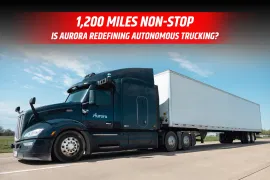The commercial vehicle industry in India saw a strong upswing in October 2025. Total sales reached 1,07,841 units against 91,635 units in October 2024, marking a growth of 17.69% YoY. On a month-to-month scale, sales grew 49.52%, rising from 72,124 units sold in September 2025. The growth reflects active freight movement, stable financing and expanding infrastructure work across the country.
Overview of Segment
Light Commercial Vehicles (LCVs)
The category of light commercial vehicles set the growth curve for India. Sales grew to 72,948 units from a previous month of 56,182 units - a sharp increase of 29.84%. Demand was driven from the need for rural delivery networks, e-commerce shipments and small-scale logistics. There was good demand for compact trucks in tier-II and tier-III markets. Operators prefer LCVs for their fuel efficiency, quick turnaround and affordability. The rising demand from rural trade and agricultural transport also contributed volume to this category.
Medium Commercial Vehicles (MCVs)
The medium commercial vehicle category had steady growth in volumes. Sales increased from 5,992 units in October 2024 to 7,177 units in October 2025, which is a growth rate of 19.78%. This category had demand for movement of construction materials, regional freight and industrial supplies. Many fleet owners upgraded to BS-VI trucks in order to achieve improved uptime and more efficiency. Improved availability of financing and moderately steady freight rates helped to maintain the confidence of fleet owners.
Heavy Commercial Vehicles (HCVs)
The heavy commercial vehicle segment saw a dip in sales for a short-term period. Sales had dropped from 29,376 units in October 2024 to 27,685 units in October 2025, showing a decline of 5.76%. This slowdown in sales was due to lower demand for bulk cargo and delays in project management. However, we forecast a steady improvement driven by infrastructure and mining projects ramping up. Fleet modernization and use of digital telematics continued to support positive long term growth in HCVs.
OEM Performance
In market share, Tata Motors maintained the lead with 37,530 units sold, up 10% over last year, on the back of its extensive portfolio of light to heavy trucks catering to different requirements of fleet operators. Ashok Leyland performed well in multi-axle and tipper segments driven by construction demand. Mahindra & Mahindra dominated small and intermediate vehicle sales in the countryside. Eicher witnessed stable demand for its range of efficient and connected trucks. BharatBenz's premium truck deliveries improved sequentially, restoring confidence among long-haul operators.
Key OEM Highlights
| Manufacturer | Estimated Sales (Oct 2025) | Growth Comment |
| Tata Motors | ~37,530 units | Maintained leadership across segments (+10 % YoY) |
| Ashok Leyland | ~18,200 units | Strong tipper and multi-axle sales |
| Mahindra & Mahindra | ~15,500 units | LCV leader in semi-urban markets |
| Eicher Trucks & Buses | ~11,000 units | Growth driven by fuel-efficient models |
| BharatBenz (Daimler India) | ~5,200 units | Consistent premium truck growth |
| Others (SML Isuzu, Piaggio, Force Motors, etc.) | ~8,400 units | Moderate growth via niche segments |
Regional and Fuel Trends
The growth anchor continued to be rural India. Retail sales grew 25% in rural areas and expanded 10.7% in urban regions. This is indicative of stronger transport activity in the agricultural and interior markets.
Of the vehicles sold, 81.67% were diesel-based, 12.48% used CNG or LPG and 1.64% were electric. Though small, electric adoption signals an industry move toward sustainability.
Key Growth Factors
- Infrastructure Investment: The road, bridge and industrial projects lifted freight volumes.
- Freight Revival: Agriculture, FMCG and festive-season logistics boosted utilization.
- Vehicle Modernization: Fleet renewal under the BS-VI norms improved fuel and service efficiency.
- Economical Financing: Lower interest and flexible repayment lured new buyers.
- Digital Tools: Telematics and fleet management solutions improved visibility and uptime.
Industry Outlook
The outlook for commercial vehicle sales in India is optimistic for FY2025–26, given strong freight activity and continuous infrastructure projects taking place. Light and medium vehicles will support near-term growth, while heavy trucks should see recovery with returning industrial spending. The transition to CNG, electric and LNG vehicles will continue gradually, aided by OEM advances in space and government policy.
Conclusion
The October 25 vehicle report indicates that India's CV industry is showing an increase of sales since lockdown. Total sales increased by 17.69% year-on-year and sales in the light and medium categories were exceptionally strong during the same earnings period. Heavy vehicles experienced a slight decline, but the overall market for heavy trucks remains healthy.
For more articles and news, stay updated with 91trucks. Subscribe to our YouTube channel and follow us on Facebook, Instagram and LinkedIn for the latest videos and updates from the automotive world!
Web Stories
Latest Trucks News
Categories
91trucks is a rapidly growing digital platform that offers the latest updates and comprehensive information about the commercial vehicle industry.










